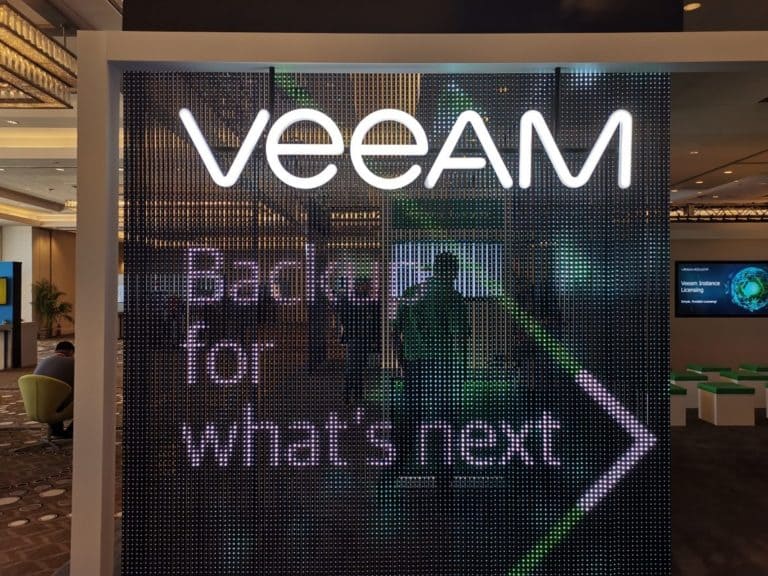Containers are the future of application development, according to many IT professionals. For the execution and management of these containers, Kubernetes is the go-to software platform. Increased use of containers and Kubernetes is to be expected. Because of this, data management player Veeam decided to acquire Kubernetes’ backup & disaster recovery speciality with the acquisition of Kasten.
Veeam doesn’t really acquire companies that often. They usually build their own technology. However, it is willing to make a major purchase for container specialism. Veeam agreed to pay 150 million dollars (127.4 million euros) for the acquisition of Kasten. We asked Danny Allen, CTO of Veeam, what they have planned for Kasten.
Importance of containers
Currently, Veeams core activities are focused on hybrid cloud data management. This means providing a platform for the management of data and making sure that data and processes are available. This ‘availability’ message should apply to each infrastructure. Whether it’s environments in the cloud or on-premise: data is everywhere. This is what Veeam aims to respond to.
A logical next step could be to extend the capabilities of Veeam to containers. After all, the cloud has popularised so-called microservices. Applications get split up, so resources can be deployed where they’re really needed and the applications work better. This works efficiëntly with containers. They contain the needed code, dependencies, libraries, etc. For containers, the orchestration platform Kubernetes is the standard.
Containers also ensure that the code is very portable, meaning that it can be easily applied to different infrastructures. Because Veeam aims to support as many infrastructures as possible with hybrid cloud data management, obtaining container specialism is, in our view, a logical step.
Allan also tells us that customers were asking about the Kubernetes strategy of Veeam. Not every Veeam user is currently actively using Kubernetes, but many wanted to know what the data management vendor would offer in this aspect in the future. This is clarified with the acquisition of Kasten.
Independence and close cooperation
Veeam plans to keep Kasten as an independent subsidiary so the focus remains on technology and innovation. In the meanwhile, the companies will work on the integration of their technologies. “This means they will make the backup, but then send the data to an external repository so we can take care of data management”, Allan says. For example, users can then perform recoveries for a Kubernetes-based workload directly from the Veeam platform.
Allan also points out that the goal is to continue and strengthen the collaboration with Kasten, which was announced in May. At the time, the companies started collaborating on sales, marketing and technology. The companies found a shared vision: data must be protected at all cost. This means supporting as many potential scenarios as possible: multiple settings (on-premise and/or cloud), multiple storage vendors, multiple workloads (traditional or containerised) and multiple data services.
In addition to the fact that their previous collaboration facilitated the acquisition, Veeam had another reason to acquire Kasten. Allen points out that Kasten has some unique technology. According to him, other players perform Kubernetes data protection on the storage level. For example, instead of taking snapshots of storage systems, Kasten is app-centric. By focusing on the application itself, it becomes less important to the data management functionality where the application is based, decreasing complexity in the infrastructure.
Laying the foundation for the future
With the acquisition of Kasten, Veeam is preparing for the coming years. Kubernetes isn’t fully mainstream yet, but that’s expected to change. This also includes backup & disaster recovery, which Kasten can offer. To support its users in the age of containers and Kubernetes, Veeam has opted for a substantial takeover.
Kasten will continue to be offered as a standalone product. Veeam and Kasten want to make it as easy as possible for customers and that’s why they’re integrating the solutions as closely as possible. We can expect even more in this area in the future, as the Veeam-Kasten collaboration is still in its infancy. Further integration simply takes time.
Because of this, we’re curious about Veeam’s next big step. Anyways, it is the first major acquisition by Veeam after the company itself was bought by Insight Partners for 5 billion dollars. When asked, Allen indicates that this step shows that Insight Partners continues to invest in Veeam growth, although Kasten is a Veeam acquisition.
Tip: At Veeam, the focus in the coming period will be on the hybrid cloud
